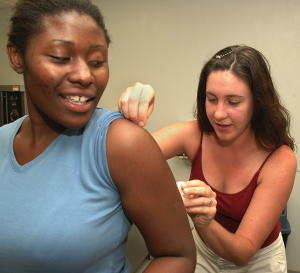
by Laurie Osgood | Mar 3, 2020
Friendships are an important part of life, and friendships can have a tremendous impact on our personal well-being and overall mental and physical health. Social isolation can lead to depression and loneliness. The relationships that we build with our family and friends can affect the quality of the friendships that we develop over our lifetimes. Some people thrive socially and develop deep, meaningful connections with others, while others only maintain distant friendships. However, it is important for us to help our children learn to develop these important social skills. Researchers have long documented links between the quality of relationships between family members and their relationships with their peers. Participation in team sports can have lasting benefits, including responsible social behaviors, good sportsmanship, strong leadership skills, academic success, and self-confidence.

Parents can form lasting friendships while supporting their kids in youth sports. (Photo source: Laurie Osgood, UF/IFAS Extension)
When It Comes to Youth Sports, Parents Don’t Always Behave Themselves.
As team sports become more competitive, there is increased attention placed on the negative aspects of team sports, mainly parental expectations and behavior. Having spent a large part of my life sitting in the stands watching my children play team sports, I have developed deep, long-lasting friendships with the parents of my children’s friends. These friendships are often maintained between parents long after our children put away their soccer cleats. Of course, overbearing parents can take the fun out of sports for our children. Many children drop out of team sports because they are no longer having fun and participation becomes too stressful.
What Can Parents Do to Help Their Kids Develop Positive, Warm Friendships?
- Continue to nurture and support the friendships that you have established throughout your lifetime.
- Be a good sports parent by showing support to your child.
- Model good friendship skills. This will help youth understand social competence.
- Be happy and have fun at your child’s competitions.
- Minimize pressure & don’t coach your child from the sidelines.
- Nurture the youth’s ambitions, but don’t let them get too wrapped up in the competitiveness.
- Be respectful of your child’s teammates, coach, opponents, and the game’s rules and traditions.
It is our job as parents to teach our children social skills to help them grow as individuals, not just athletes. As parents it is our job to nurture their emotional and physical development. Even as adults we must continue to stay connected with our friends and families. As we grow older, good friendships can prevent loneliness, improve our health, boost our well-being, and even add years to our lives.

by Melanie Taylor | Jan 9, 2020

One of the best ways to help prevent the flu this season is to get vaccinated. Even if you still get the flu, the severity and length of illness may be diminished. (Photo source: UF/IFAS file photo)
The holiday season has passed and now we are well on our way into 2020 with a very severe flu season. You are the best person at making sure you do not get the flu. Here are a few tips that you should consider as this flu season continues and still has not reached its peak.
- GET VACCINATED. It takes, on average, two weeks for the flu vaccine to reach its full potential, so if you have not gotten the flu shot, get it NOW. Even if you still get the flu, it will likely be shortened in time and strength if you are vaccinated.
- WASH YOUR HANDS. Washing your hands frequently will help protect you from the flu. If soap and water are not available, use an alcohol-based hand sanitizer.
- AVOID CLOSE CONTACT WITH PEOPLE WHO ARE SICK. Be sure to avoid direct contact with anyone that is sick. If you must come in contact with them be sure to wash your hands once you leave. If you are sick, keep your distance from others to protect them from getting sick too.
- AVOID TOUCHING YOUR FACE. Germs are spread quickly when a person touches something that is contaminated with germs and then touches his or her eyes, nose, or mouth. So make a conscious effort to keep your hands away from your face.
- COVER YOUR MOUTH AND NOSE WHEN YOU COUGH AND SNEEZE. Cover your mouth and nose with a tissue when coughing or sneezing, or sneeze/cough into your closed elbow. These steps may prevent those around you from getting sick.
- STAY HOME WHEN YOU ARE SICK. If possible, stay home from work and school when you are sick. This is the best way to avoid spreading your germs to other people. The CDC (Centers for Disease Control and Prevention) recommends you stay home for at least 24 hours after your fever is gone except to get medical care or for other necessities. They also recommend that your fever should be gone for 24 hours (without the use of a fever-reducing medicine) for you to no longer be considered contagious.
- PRACTICE GENERAL GOOD HEALTH HABITS. Clean and disinfect frequently touched surfaces at home, work, and school, especially when someone is sick. Wash backpacks, coats, and other items regularly. Get plenty of sleep, be physically active, manage your stress, drink plenty of fluids, and eat nutritious food.
Follow the tips above and maintain the best health practices possible and hopefully you will be one of the lucky people that avoids the dreaded flu this year. Wishing you all a healthy and happy 2020!
Source: https://www.cdc.gov/flu/prevent/prevention.htm

by Stephanie Herzog | Oct 11, 2019
Have you ever been bullied or know someone who has been bullied? I know I have. October is National Bullying Prevention Month. Each October since 2006, there has been a national effort to raise awareness about bullying and provide education and resources to try to prevent it. According to data from 2017, about 20% of youth ages 12-18 experienced bullying at school and nearly 30% reported cyberbullying during their lifetime. That is a lot of our country’s youth!
What Exactly is Bullying?
Bullying is unwanted aggressive behavior. Bullying must have a real or perceived power imbalance between the bully and the victim, where the bully uses their power to control or hurt their victim. The bullying behavior needs to be repeated over time, or at least have the potential to repeat over time.
There are three categories of bullying:
- Verbal bullying includes teasing, taunting, threats, or name-calling
- Social or relational bullying includes ignoring someone on purpose, ostracizing, spreading rumors, or embarrassing someone
- Physical bullying includes damaging belongings or harming another’s body such as spitting, hitting, pushing, rude gestures, or tripping

The constant and easy access of cell phones, social media, and the internet has increased the real dangers of cyberbullying. (Photo source: UF/IFAS)
Cyberbullying
Technology has changed the ways of bullying. Bullying is no longer only ‘picking on’ someone, making fun of them, calling them names, or ignoring them at school. The constant and easy access of cell phones, social media, and the internet has truly expanded bullying to an unthinkable, unending scale. There are many ways to bully someone online, including:
- Verbal attacks, mean messages, or rumors on social media accounts, online games such as Fortnite, or through email or text
- Releasing embarrassing or inappropriate pictures, GIFs, or videos online or through text (e.g. sexting)
- Creating fake profiles or hacking into someone’s account online in order to hurt that person
Perhaps one of the most dangerous things about cyberbullying is once something is posted online and is circulated, it’s very hard to permanently remove. This oftentimes makes escape from the bullying unusually difficult or even seemingly impossible. It’s so important to keep up with ways technology is advancing in order to protect ourselves from things like cyberbullying.
Effects of Bullying
The negative psychological effects of bullying are very real – for the bully, the victim, and those who may witness it.
For the bully, they have a greater risk of using substances, engaging in risky or violent behavior, being abusive in future relationships, committing crimes, and developing other external behavior problems.
Effects of bullying include low self-esteem, fear, loneliness, heartache, and potential physical illness. These effects put a widespread toll on the mental, physical, and social health of the victims and also those who witness bullying. The increased risk of using addictive and illegal substances, anxiety, depression, eating disorders or even becoming suicidal are to be taken seriously and should be treated appropriately. Seek out mental health professionals or physicians and consult with them on the best combination of treatment. These effects can last days, months, years, or even lifetimes depending on the person and the circumstance.
The Story of Amanda Todd
The story of Amanda Todd is an unfortunate real example of cyberbullying and how unforgiving and never-ending it can be. Amanda ultimately committed suicide to get away from it; she was only 15 years old. Her YouTube video, published in 2012 a month before she committed suicide, has 13.5 million views to date. To better understand the reality of bullying, please consider watching it or sharing it. However, viewer discretion is advised.
Bullying, harassment, discrimination, or any other type of negative, cruel, or harmful behavior is never okay or acceptable in any way. If you have been a witness of bullying or a bully, stand up to stop it! If you have been bullied or know someone who has, please seek help from caring professionals, family, or friends. Go-to resources are found below.
Additional Resources
Stop Bullying Now Hotline: 1-800-273-8255
- Available 24/7, managed by the U.S. Department of Health and Human Services
National Suicide Prevention Lifeline: 1-800-273-8255
- Available 24/7, there is an online chat option available here
The Trevor Project: 1-866-488-7386
- Available 24/7, suicide prevention help specifically for the LGBTQ+ community
- Texting and chat options are available here
National Eating Disorders Association: 1-800-931-2237
- Mon-Thu 9am-9pm, Fri 9am-5pm
The Cybersmile Foundation
STOMP Out Bullying
Stopbullying.gov
Sources
National Center for Educational Statistics, Indicators of School Crime and Safety Indicator 10: Bullying at School and Electronic Bullying, April 2019.
Cyberbullying Research Center
The Amanda Todd Legacy

by Melanie Taylor | May 6, 2019

Hanging with friends at 4-H Camp. Melanie Taylor as a 4-H Teen Counselor (right). Photo source: Melanie Taylor
Spring is upon us and 4-H Summer Camp preparations are in full swing. As a 4-H Agent preparing for our week of county 4-H camp, my days are busy with phone calls and emails from parents, teen counselor trainings, adult volunteer screenings, paperwork, paperwork, and more paperwork. Although this is a very busy time for me as a 4-H Agent, it also allows me to reflect on why I chose this career path and why there is a sense of nostalgia as I prepare for 4-H camp.
I attended 4-H camp in Virginia, where I grew up, every year from age 9-18. I was a camper who grew into a counselor-in-training and then a counselor. Those weeks of 4-H camp were filled with hot days and warm nights, but it was worth it all for the memories I will have for a lifetime. I can still smell the cafeteria food and hear the sounds in the gymnasium as kids played basketball and pounded at their leathercraft projects. I can feel the chills I would get as the entire camp sang around the campfire circle and patiently waited for the canoe to land on the lake’s edge; the camp staff would carry a flame as they entered the campfire circle and ceremoniously light the fire. Most importantly, I am still connected with my 4-H camp friends through social media and/or as close friends and we continue to share our old, blurry camp pictures from the 1990’s each year on Facebook.

Morning flag raising ceremony at Camp Timpoochee. Photo source: UF/IFAS Northwest District
So, as I work hard to prepare camp for my county campers and teen counselors, I want to create similar memories for them. In ten, twenty, and thirty years from now, I want them to think back on the fun moments they experienced in the Florida 4-H camping program. I also want them to form friendships and make camp connections for a lifetime, whether it is learning to kayak, fish, make arts and crafts, cook over a campfire, sing camp songs, etc.
With all of this said, I hope you as parents will consider giving your child(ren) these special moments. The days will be long, but fun, and their nights will be filled with campfires and hanging out with friends. When they arrive home on Friday, they will be exhausted, but so excited to share all of the camp songs with you (prepare yourself for lots of loud, enthusiastic singing). They will have new friends they want you to meet and they will tell you camp stories they will always cherish.
In Northwest Florida, there are two 4-H Camps, Camp Cherry Lake in Madison and Camp Timpoochee in Niceville. Each county in these camping districts has one county week of camp each summer. Contact your local UF/IFAS Extension Office now to find out the details and register your child for a week of fun and memories.

Northwest Florida 4-H Camp Dates 2019. Photo source: UF/IFAS Extension

by Heidi Copeland | Apr 30, 2019

The Consumer Financial Protection Bureau, (CFPB) has defined financial capacity as a the combination of attitude, knowledge, skills, and self-efficacy needed to make and exercise money management decisions that best fit the circumstances of one’s life, within an enabling environment that includes, but is not limited to, access to appropriate financial services.
Many of the attitudes, knowledge and skills needed to build financial capacity can be learned. People learn behavior through a variety of contexts. Children, in particular, learn through practices modeled by a parent or caregiver. In fact, research shows that parents and caregivers have the most influence on their children’s financial capability.
If you are like most parents, you probably recognize this—and you are interested in setting your kids on a good path toward financial well-being. However, many parents also say they do not always have time, tools, or personal confidence to start talking about money thinking their children will learn about it in school, later on, when they are old enough to understand.
This is most unfortunate. According to the Council for Economic Education 2018 Survey of the States, only 17 States require high school students to take a course in personal finance. So, if a parent isn’t teaching their children basic money/financial skills who is? Economical and financial literacy is a foundational element to achieving financial health and financial well-being. It is never too early (or too late) to start building this.
Talking to children about money, even in EARLY CHILDHOOD, helps children build the skills they need later in life. Early childhood education experts like to call this scaffolding. You are setting the framework…the support…the platform, encouraging financial capability milestones from early childhood into young adulthood. Children can learn the behaviors, knowledge, skills, and personal characteristics that support financial health and well-being.
Books can help start these critical early conversation. The CFPB has made it EASY! Parents can be their child’s first financial capability teacher! The University of Wisconsin-Extension Family Living Programs and the University of Wisconsin-Madison Center for Financial Security have selected books for the CFPB Money as you Grow Book Club. This program uses easy to read and understand children’s books to discuss money concepts. These books include many favorites:
- A Bargain for Frances, by Russell Hoban
- A Chair for My Mother, by Vera Williams
- Alexander, Who Used to Be Rich Last Sunday, by Judith Viorst
- Count on Pablo, by Barbara deRubertis
- Cuenta con Pablo, by Barbara deRubertis
- Curious George Saves His Pennies, by Margaret and H.AS. Rey
- Just Shopping With Mom, by Mercer Mayer
- Lemonade in Winter, by Emily Jenkins
- My Rows and Piles of Coins, by Tololwa M. Mollel
- Ox-Cart Man, by Donald Hall
- Sheep in a Shop, by Nancy Shaw
- The Berenstain Bears & Mama’s New Job, by Stan & Jan Berenstain
- The Berenstain Bears’ Trouble With Money by Stan and Jan Berenstain
- The Purse, by Kathy Caple
- The Rag Coat, by Lauren Mills
- Those Shoes, by Maribeth Boelts
- Tia Isa Wants a Car, by Meg Medina
- Tia Isa Quiere un Carro, by Meg Medina
Fortunately, many of the building blocks for good financial decision making – like self-regulation, patience, planning, and problem-solving – do not require a lot of financial know-how.
Reading books with children is a creative way to learn about the many sides of money management. Pick up a few of the titles at your local library and influence your children’s financial capability. Building good habits leads to a life of good financial health and well-being.
Example of key ideas from reading books:
| PLANNING |
How Children Show It |
| Making Decisions |
Can look at a few choices and select on what will bring the best results. |
| Setting Goals |
Can follow a multi–step plan. |
| Prioritizing |
Can prioritize choices when they want two or more things at once. |
| Solving problems
|
Can describe problems and come up with a few idea to make things better. |
| MONEY |
|
| Earning |
Can identify the different jobs people in the family and in the community do to earn money and keep it safe. |
| Spending |
Make spending choices with their own money – real or play. |
| Saving |
Keeps money in a safe place and keeps track of amount saved for future spending. |
| Sharing and borrowing |
Can explain the difference between lending and giving something away. |
| ME |
|
| Self-control |
Can talk about times when they were able to wait and how they were able to do it. |
| Follow-through |
Can identify who they can turn to for help reaching a goal, or what tools or tricks might help them stick with a plan. |
| Staying true to yourself |
Name one special thing they like about themselves and their loved ones. |
| Flexibility |
Can talk about a time when their plans did not turn out how they wanted and what they did instead. |
Resource: https://www.consumerfinance.gov/consumer-tools/money-as-you-grow/

by Melanie Taylor | Dec 7, 2018
As the holiday season quickly approaches, many people are filled with extra holiday cheer and enthusiasm. Some are jolly, but still overwhelmed with all of the activities, decorating, and shopping that needs to be completed. Then, there are those that find the holiday season as a reminder of things such as, the death of a loved one, family feuds, divorce, and the list goes on. If you are feeling this way here are a few tips to make getting through the season a little bit easier.
1. Feel your emotions – Many people want to suppress their sadness or anxiety, but this only makes it worse. We are all allowed to grieve, cry and feel mad at times. If you feel this way, let yourself feel your feelings. You will feel better once you have accepted and worked through the emotions. You also do not have to force yourself to feel happy just because it is the holiday season.
2. Reach out to others – Instead of secluding yourself spend time with others, whether it is at church, a community group or with family and friends. Spending time with others and socializing is good for the spirit. In addition, there are tons of volunteer opportunities during the holidays. Try something new and volunteer your time to a worthy cause. You will feel great about helping others and contributing to the cause. Research such as this one conducted by UnitedHealth Group commissioned a national survey of 3,351 adults and found that the majority of participants reported feeling mentally and physically healthier after a volunteer experience. The research showed:
- 96% reported that volunteering enriched their sense of purpose in life
- 94% of people who volunteered in the last twelve months said that volunteering improved their mood
- 80% of them feel like they have control over their health
- 78% of them said that volunteering lowered their stress levels
- 76% of people who volunteered in the last twelve months said that volunteering has made them feel healthier
- About a quarter of them reported that their volunteer work has helped them manage a chronic illness by keeping them active and taking their minds off of their own problems
- Volunteering also improved their mood and self-esteem
3. Be realistic – Realize that times and traditions change as families grow and age. Do not focus on everything having to be the same every year. Be willing to accept changes, such as adult children may not be able to attend the family gathering, so utilize technology and talk through video conferencing, share pictures on email and/or Facebook. Find a way to make it work.
4. Set aside differences for everyone’s sake. Aim to accept family and friends the way they are, even if they do not meet your expectations. Leave grievances at the door for the day and enjoy your family and friends. Share those grievances and talk at a more appropriate and private time. Also, remember they could be feeling the stress of the holiday too. So, be patient if someone is grouchy or sad as you celebrate. You may both be feeling the same way.
5. Learn to say no – Be realistic in the number of activities you and your family can participate. Do not feel guilty because you cannot attend every party and event you are invited too. Graciously decline an invite and share that your schedule is booked, but thank them for thinking of you. A host does not expect that everyone will attend their parties.
6. Take a breather as needed – If you start to feel overwhelmed with anxiety, anger or sadness take a few minutes to be alone. Take 15 minutes to spend in the quiet to reduce the stress and clear your mind. For example: listen to soothing music, do a few mindful breathing exercises to slow yourself down or read a book to temporarily escape the stress.
7.Seek professional help as needed – there are times when the emotions are just too overwhelming to sort through on our own. If you continue to feel sad, anxious, angry, etc. there is absolutely no shame in seeking the help of a doctor or mental health professional. It will only help you work through your feelings with a non-bias person. Helping yourself feel better will improve your quality of life and those around you.
Do not let the idea of the holidays turn you into a modern day Ebenezer Scrooge. Learn to take care of yourself first. Learn your limitations and accept them. Do not let others’ expectations overwhelm you. Just remember when you start feeling extreme levels of emotions and/or stress take a few deep breathes and remind yourself to relax and feel the moment. Be mindful of your surroundings and remind yourself of your many blessings, even when going through difficult times. Make it your personal goal to feel your feelings and enjoy what you can about the holiday season, whether it is the twinkling lights, time with friends and family, the food or any of the many special holiday traditions.

Aim to find JOY during this holiday season.
Sources:
Stress, depression and the holidays: Tips for coping. www.mayoclinic.org,
Signs and Symptoms of Depression http://edis.ifas.ufl.edu/pdffiles/FY/FY10000.pdf
Depression and Older Adults http://edis.ifas.ufl.edu/pdffiles/FY/FY95200.pdf














